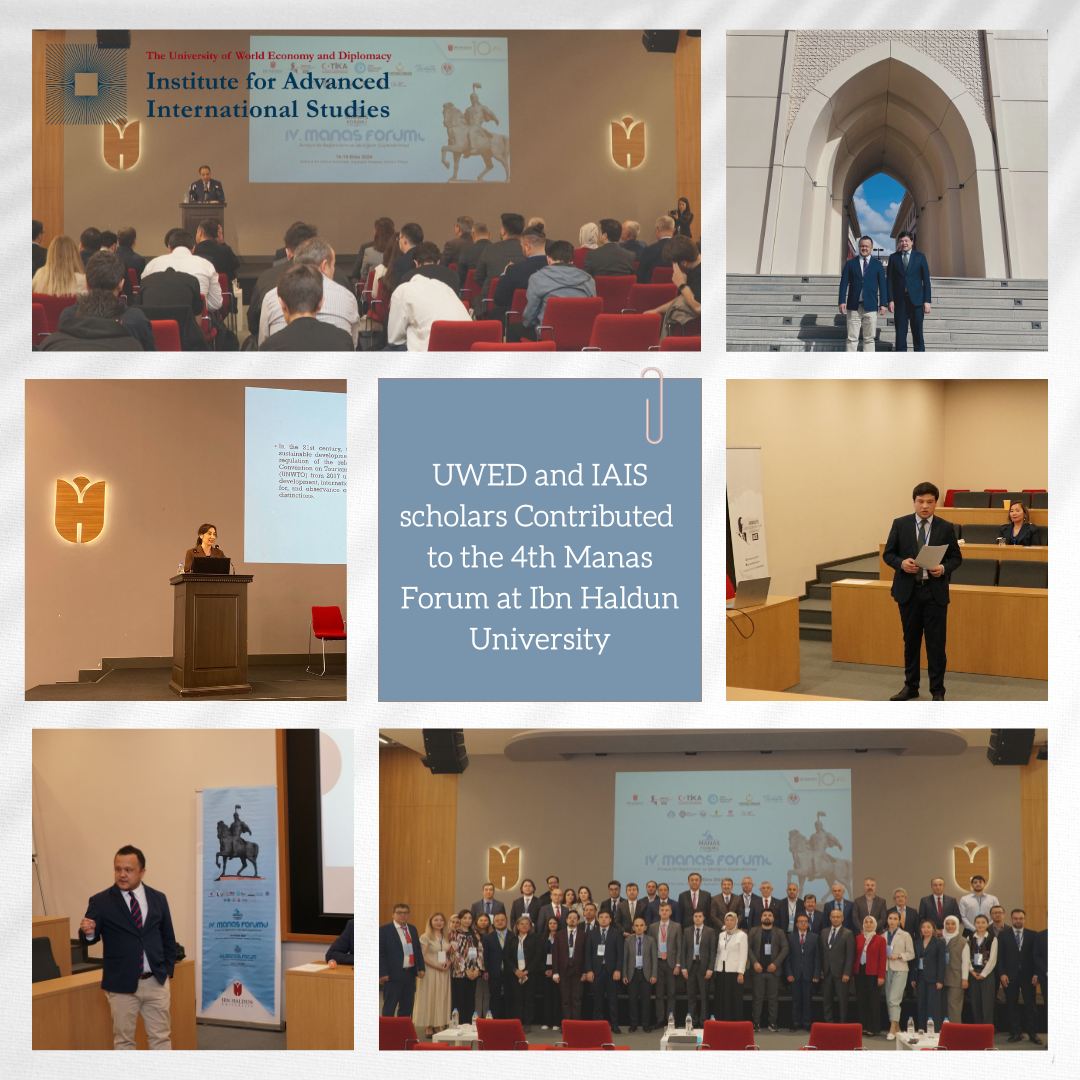
From October 16 to 18, the conference on Enhancing Connectivity and Cooperation in Eurasia within 4th Manas Forum took place at Ibn Haldun University (IHU) in Istanbul, where leading scholars, policymakers, and diplomats from the Turkic world gathered to discuss pivotal issues shaping the region. On behalf of the University of World Economy and Diplomacy (UWED), the event was attended by Mr. Shakhboz Akhmedov, Deputy Director of the Institute for Advanced International Studies (IAIS) at UWED, Ms. Surayyo Usmonova, Associate Professor at UWED International Law Faculty, and Mr. Doston Mashrabov, a UWED researcher, who represented Uzbekistan’s critical voice in interregional cooperation. Their active participation underscored the significance of their contributions to the Eurasian geopolitical and economic integration discourse, with a specific focus on Central Asia’s strategic role.
The conference opened with remarks from distinguished figures, including H.E. Ambassador Kubanychbek Omuraliev, Secretary General of the Organization of Turkic States (OTS). His keynote speech highlighted the importance of educational collaboration within the Turkic world, reflecting the OTS’s commitment to fostering unity through educational projects. The event also saw addresses from prominent academic leaders, such as Prof. Dr. Atilla Arkan, Rector of Ibn Haldun University, and Prof. Dr. Alparslan Ceylan, Rector of Kyrgyz-Turkish Manas University, all of whom reinforced the importance of academic cooperation in advancing Turkic integration.
During the Forum, Mr. Shakhboz Akhmedov’s presentation, titled “Leveraging Water Diplomacy for Regional Cooperation: Water Security and Climate Resilience in Central Asia,” delved into the critical issue of water security, a pressing concern for Central Asian states that share transboundary water resources. In his thought-provoking address, the speaker argued that water diplomacy serves as a vital mechanism for fostering cooperation and reducing regional tensions. He presented innovative strategies for mitigating the adverse effects of climate change through sustainable water management, calling for strengthened platforms for dialogue among Central Asian nations. Mr. Akhmedov’s insights were met with strong resonance, as many participants acknowledged the urgency of addressing water security to promote environmental sustainability and regional stability.
Another distinguished scholar of UWED, Ms. Surayyo Usmonova, delivered an important presentation discussing “Perspectives of Contractual-Legal Cooperation in Tourism Development in the Framework of the Organization of Turkic States.” Her work shed light on the legal frameworks required to enhance tourism cooperation within the Turkic world, outlining potential strategies for leveraging the region’s rich cultural heritage to foster stronger ties among member states. Her presentation illustrated how tourism, as a soft power tool, can play a critical role in advancing unity and mutual understanding within the region.
Meanwhile, Doston Mashrabov provided a comprehensive analysis of trade, logistics, and institutional collaboration under the OTS framework, emphasizing the potential for deeper integration among Turkic states. His presentation on “The Role of Central Asia in Turkic World’s Integration” focused on how logistical infrastructure, such as transport corridors and energy pipelines, can bolster economic cooperation across the region. By outlining the achievements and ongoing projects within the OTS, he highlighted how such initiatives contribute to economic stability and prosperity, strengthening the region’s role as a crucial hub for Eurasian connectivity.
The discussions throughout the conference echoed a shared understanding of Central Asia’s pivotal role in the broader Eurasian landscape. Positioned along key trade routes that connect Europe, Asia, and the Middle East, Central Asia is essential to projects like the Middle Corridor, which aims to enhance connectivity between East and West through the region. The Forum highlighted how initiatives focusing on infrastructure, trade, and education can lead to deeper integration within the Turkic world and beyond.
Looking forward, the insights gathered from this event are expected to contribute to future discussions on policy-making, infrastructure development, and sustainable solutions to the shared challenges of the Eurasian region. The participation of our scholars not only elevated Central Asia’s voice in these vital conversations but also reinforced the region’s significance in fostering cooperation, stability, and prosperity across the Turkic world.
This event provided a unique opportunity for Central Asian experts to engage with their counterparts from other Turkic states, showcasing their contributions to Eurasia’s evolving geopolitical and economic architecture.